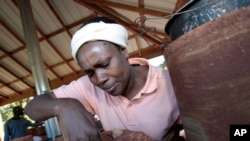ACCRA, GHANA —
Renewable energy is playing a meaningful role in some remote communities in Ghana where more than 2,000 solar systems have so far been installed in off-grid locations throughout the country.
Also, a new law has been passed to regulate the sector and effort is being made to attract more private investments.
Alfred Ofosu-Ahenkorah is the executive secretary of Ghana’s Energy Commission. He said Ghana abounds in renewable energy resources and households must be encouraged to shift focus from burning wood to generate energy.
“We all use firewood for cooking and that makes about 50 percent of the energy we use in Ghana. Cutting more trees means we are depleting our bush, our forests and it’s also leading to climate change. The rivers are drying so it has implications on society and on livelihood”.
Ghana’s commitment to expand the sector led to the passage of the Renewable Energy Act in 2011. So far, 13 licenses have been released for the development of 1,000 megawatts of solar energy, small hydropower plants and wind energy.
Areas of concentration are off-grid islands on the Volta Lake and some parts of the Volta region. Other hard-to-reach places are in the Sene District of the Brong Ahafo region. Public facilities such as schools, clinics and security outposts will benefit.
Ofosu Ahenkorah said renewable energy is bringing changes to the lives of people in these areas.
“School children can learn during the evenings. People who want to trade can do that in the evenings and it’s bringing them communication, entertainment and all the social amenities that they need”.
More than 20,000 solar lanterns have also been distributed to reduce dependence on kerosene in some rural communities. Furthermore, studies are being carried out to determine the wind energy potential for power generation.
in
Also, a new law has been passed to regulate the sector and effort is being made to attract more private investments.
Alfred Ofosu-Ahenkorah is the executive secretary of Ghana’s Energy Commission. He said Ghana abounds in renewable energy resources and households must be encouraged to shift focus from burning wood to generate energy.
“We all use firewood for cooking and that makes about 50 percent of the energy we use in Ghana. Cutting more trees means we are depleting our bush, our forests and it’s also leading to climate change. The rivers are drying so it has implications on society and on livelihood”.
Ghana’s commitment to expand the sector led to the passage of the Renewable Energy Act in 2011. So far, 13 licenses have been released for the development of 1,000 megawatts of solar energy, small hydropower plants and wind energy.
Areas of concentration are off-grid islands on the Volta Lake and some parts of the Volta region. Other hard-to-reach places are in the Sene District of the Brong Ahafo region. Public facilities such as schools, clinics and security outposts will benefit.
Ofosu Ahenkorah said renewable energy is bringing changes to the lives of people in these areas.
“School children can learn during the evenings. People who want to trade can do that in the evenings and it’s bringing them communication, entertainment and all the social amenities that they need”.
More than 20,000 solar lanterns have also been distributed to reduce dependence on kerosene in some rural communities. Furthermore, studies are being carried out to determine the wind energy potential for power generation.
in





